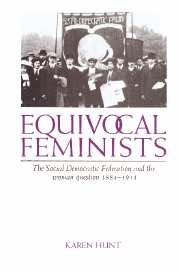Book contents
- Frontmatter
- Contents
- Acknowledgements
- Introduction
- Part 1 The woman question: the theory
- Part 2 The SDF and the woman question: the theory and practice of the party on aspects of the woman question
- Part 3 Women and the SDF: the practical implications of the SDF's understanding of the woman question
- Conclusion
- Appendices
- A comparison between women on the Executives of the SDF and the ILP
- A comparison between women delegates at SDF and ILP Annual Conferences
- A graph of the number of local Women's Socialist Circles, 1904–11
- SDP Women's Education Committee syllabus of subjects for discussion, 1910–11
- Short biographies of key figures
- Bibliography
- Index
Short biographies of key figures
Published online by Cambridge University Press: 14 January 2010
- Frontmatter
- Contents
- Acknowledgements
- Introduction
- Part 1 The woman question: the theory
- Part 2 The SDF and the woman question: the theory and practice of the party on aspects of the woman question
- Part 3 Women and the SDF: the practical implications of the SDF's understanding of the woman question
- Conclusion
- Appendices
- A comparison between women on the Executives of the SDF and the ILP
- A comparison between women delegates at SDF and ILP Annual Conferences
- A graph of the number of local Women's Socialist Circles, 1904–11
- SDP Women's Education Committee syllabus of subjects for discussion, 1910–11
- Short biographies of key figures
- Bibliography
- Index
Summary
ERNEST BELFORT BAX (1854r-1926) was born into a non-conformist middle-class family. He joined the SDF's predecessor the Democratic Federation in 1882. Having read Capital in 1879, he published an account of Marx's writings in 1881 which was praised by Marx. Bax was part of the group, which also included Morris and the Avelings, that seceded from the SDF in December 1884 to form the Socialist League. He lectured and wrote for the League but returned to the SDF in 1888, before many of his ex-SDF comrades did likewise. From then on he was to be a significant figure in the SDF's leadership, briefly editing Justice in 1892. He does not seem to have been particularly concerned to participate in branch life and increasingly spent a proportion of his time abroad. He devoted himself to theoretical writings and studied to become a barrister in the 1890s. Bax lived on inherited income which he supplemented with journalism. Although generally a libertarian, Bax was renowned for his anti-feminism and anti-suffragism. He maintained his particular brand of socialism into the BSP, only leaving in 1916 with what was left of the ‘old guard’ to form the National Socialist Party. For one account of Bax's life and politics, see his autobiography, Reminiscences and Reflexions of a Mid and Late Victorian.
- Type
- Chapter
- Information
- Equivocal FeministsThe Social Democratic Federation and the Woman Question 1884–1911, pp. 265 - 273Publisher: Cambridge University PressPrint publication year: 1996

